




 |
   |
 |
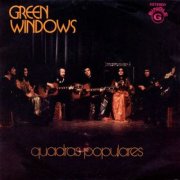 |
7" (1975) *½/TT Quadras Populares Ana Karen |
Current availability:
Mellotron used:
Green Windows were a Portuguese vocal group of the '70s, whose music, at least going by 1975's Quadras Populares single, sat firmly in the 'very mainstream' bracket. That's 'mid-'70s Mediterranean mainstream', a branch of the cheeso Europop sound so prevalent at the time and the obvious inspiration for a thousand and one terrible Eurovision entrants. The upbeat A-side is only beaten in the 'cheese' stakes by its balladic flip, Ana Karen; a drippier effort you'd be hard-pushed to find, I can tell you.
And this is here because... Portugal's premier (only?) Mellotron owner of the time, José Cid, plays his machine on both sides of the single, with background flutes on the 'A' and more upfront strings and flutes on the flip. You actually want to hear this? A quick Internet search should locate a download, but remember: you've been warned.
See: José Cid
 |
Past Your Eyes (1999, 41.08) **½/T |
|
| Pitiful You June Boxer Hill Happy New Year Stars Sugar Candy Concubine Wait |
Stalker Unwind |
|
Current availability:
Mellotron used:
Occasional They Might Be Giants collaborator, NYC-based Julia Greenberg's debut album (has she released any more?), Past Your Eyes, is a vaguely bluesy pop/rock effort, the kind of album singer-songwriters make when they don't want to go the 'intimate, confessional' route. Its has its moments (the balladic June, Sugar Candy), but too much of it wafts along in a 'middling rock' kind of way, struggling to really make an impression one way or the other.
Jeremy Chatzky and Jim Mastro both play Mellotron, with subtle string interjections on June and a skronkily-authentic string line on Happy New Year. It's possible it's way down in the mix elsewhere, but test reports come back 'inconclusive'. Nice to hear a real Mellotron, in these days of sample overkill, but, sadly, not that interesting an album.
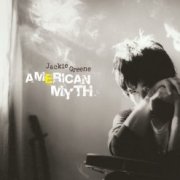 |
American Myth (2006, 66.08) ***/T |
|
| Intro Hollywood So Hard to Find My Way Just as Well I'm So Gone Never Satisfied (Revisited) Love Song, 2:00 AM When You're Walking Away |
Cold Black Devil/14 Miles Closer to You I'll Let You in Farewell, So Long, Goodbye Supersede Marigold |
|
Current availability:
Mellotron used:
Jackie Greene is a young Americana artist who began his career as independently as is possible, recording his early CD-R releases in his garage and funding the recording of his first 'proper' album himself. 2006's American Myth is his fourth such, consisting mainly of well-written alt.country material, while also diversifying into the more contemporary-sounding I'm So Gone, the beautiful acoustic I'll Let You In or the soul-influenced Closer To You and Farewell, So Long, Goodbye. Best track award possibly goes to the near-ten minute Supersede, though, a Dylan-style epic in the grand tradition.
Major session dude Steve Berlin plays percussion, vibes and Mellotron, maybe surprisingly, with an upfront cello part on the raucous Cold Black Devil/14 Miles and flutes on closer Marigold. Decent, but nothing outstanding.
See: Samples etc.
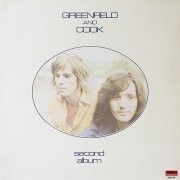 |
Second Album (1973, 35.38) **½/½ |
|
| Far Too Late Anthony We Want You Girl, How I Love You Burgy Dog Food A Man Needs Someone to Comfort Him Easy Boy Getting Old |
Melody Child of the Morning Dew Mr. Music Man Beautiful Children |
|
Current availability:
Mellotron used:
Like several Dutch artists of the period, Rink Groenveld and Peter Kok renamed themselves, presumably to make them more acceptable to English-speaking audiences, giving us Greenfield & Cook. On reflection, I don't think there's any Mellotron on their eponymous debut, but Second Album is exactly what you'd expect: a bland, mainstream folk/pop release, very much of its time, at its least dull on Melody, although, in fairness, I rather doubt whether they were trying to create a lasting work of art; more likely, something that would make a quick buck, if they were lucky.
The Mellotron on A Man Needs Someone To Comfort Him is credited to the pair, although it amounts to no more than a relatively brief string line, so nothing to get too excited about. You know, just in case.
Greenslade (UK) see: |
 |
Dave Greenslade (UK) see: |
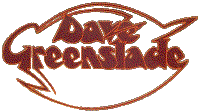 |
 |
Til Ungdommen: Musikken fra Filmen (2013, 27.53) ***/½ |
|
| Opening (How to Fly) Sana's Summer Song, Pt. 1 Keeping Me Up All Night Sana's Summer Song, Pt. 2 MS Thorbjørn July 22 Beautiful/The Rose Ceremony New Horizons |
The Election Campaign F21 Forever! Perfect Silence How to Fly (Finale) |
|
Current availability:
Mellotron used:
Til Ungdommen: Musikken fra Filmen (Bravehearts: Music From the Motion Picture) seems to be the soundtrack to a film about Norway's far-right terror attacks of 2011, and how the country pulled through. In case you were wondering, Til Ungdommen (to the Youth) itself is a poem from 1936 by Nordahl Grieg, set to music by Otto Mortensen in 1952. Of the musicians concerned, I think you're probably aware of Norwegian keyboard wizard Lars Fredrik Frøislie, or should be, Matilda Gressberg (a.k.a. Matilda) is a singer, then still in her teens, who won a Norwegian talent show aged fifteen, while Ketil Vestrum Einarsen is a flautist, mainly known for his work with Jaga Jazzist.
Much of the soundtrack is what you'd expect, soundtrack-style pop or orchestral stuff, typified by its sad-yet-triumphal theme, better tracks including Keeping Me Up All Night's synthpop moves and July 22's muted synth work. Frøislie plays Mellotron, with distant strings on F21 Forever!, although the waters are heavily muddied by the real strings used on most tracks.
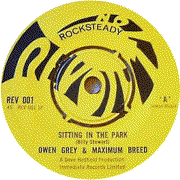 |
7" (1969) ***/TT Sitting in the Park You've Got it [by Pete Hunt & Maximum Breed] |
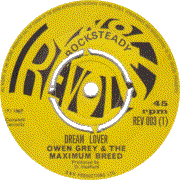 |
7" (1969) ***/TT Dream Lover Mudda-Granma-Reggie [by Maximum Breed] |
 |
Unusual Reggae (2019) ***/T½[Owen Grey contributes]Ginny Come Lately |
Current availability:
Mellotrons used:
Going by one of his many singles released in 1969, Sitting In The Park, Owen Grey (1939-2025) was a soul-end-of-reggae singer. The single, which didn't find it way onto any of the three albums he released that year (!), is longer than the era's average reggae effort, a decent cover of Billy Stewart's soul number of a few years earlier, backed with Pete Hunt & Maximum Breed's You've Got It. An unknown sessioneer plays strident, upfront Mellotron strings on the 'A', with nothing on the flip.
Grey's next (?) release, going by catalogue numbers, his take on Bobby Darin's Dream Lover, does a passable job of reggaefying the song, assuming you don't object to such minor musical bastardisation. Once again, sort-of orchestral replacement Mellotron strings from an unknown sessioneer, with nothing on Maximum Breed's flip. All titles have finally been anthologised on Circle Records' 2019 set Unusual Reggae. Incidentally, although his name is generally (and actually) spelled Gray, he tends to be credited with an 'e' on UK releases, so Grey it is.
See: Elki & Owen
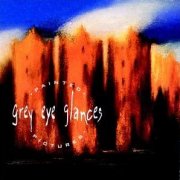 |
Painted Pictures (1998, 47.46) **½/T |
|
| Float One Day Soon Remember This Kind of Love Far Better Part of Me The Lost Coast Sleepy |
Perfect Plan Certain Understandings Close of the Day |
|
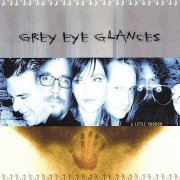 |
A Little Voodoo (2002, 41.19) **½/TT |
|
| Close Your Eyes Oh No If I Was The One Good Folks Big Red Boat He and She Even |
Keep on All Because of You |
|
Current availability:
Mellotron/Chamberlin used:
Bizarrely, two members of mainstream alt.pop/rock outfit Grey Eye Glances also play in East Coast prog gods Echolyn, which probably explains why they've found their way onto progressive sites. Believe me, going by these albums, there ain't no prog round these parts... 1998's Painted Pictures is, I'm afraid, a mainstream dullard of an album, its downbeat, female-fronted sound achingly of its time, at its least tedious on the West Coast-ish One Day Soon and Lost Coast's mildly epic feel, which is, frankly, clutching at straws. Jeff Coulter's credited with Mellotron, with persistent strings and occasional choirs (underpinned by cellos?) on The Perfect Plan, not fake enough to chuck this into 'samples'.
Their sixth album proper, 2002's A Little Voodoo, has its moments (opener Close Your Eyes, the acoustic-bluesy If I Was), but the jaunty pop of Big Red Boat and the semi-hard rock of He And She really don't work at all, while the album's overall vibe becomes irritating after a few tracks if you're not into their thang. Paul Bryan plays Chamberlin, with flutes and strings on Close Your Eyes, strings on Oh No, strings (and flutes?) on Good Folks, very upfront strings on Even and very orchestral ones on closer All Because Of You. Not the most upfront use you'll ever hear (Even excepted), but far more audible than on many credited albums. Two for 10,000 Maniacs fans, I suspect.
See: Paul Bryan
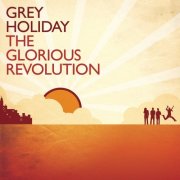 |
The Glorious Revolution EP (2007, 21.24) *½/TGloriousLet Go You Belong to Me Revolution Where You Want Me Low |
Current availability:
Chamberlin used:
Texans Grey Holiday (interestingly, using the British spelling) were a Christian outfit who never actually released an album, although I'm sure their hardcore fans have collated one from their three EPs. Their sound, at least on their final instalment, 2007's The Glorious Revolution, was the usual upbeat attempting-to-be-transcendental indie that so many current CCM bands clearly believe is the way to the nation's hearts. Maybe they're right, although I hope not. It actually has a 'best track', Revolution, although it's only 'best' in that it's not as bad as the rest of the record.
Patrick Warren on Chamberlin (you wouldn't believe on how many albums this man is featured), with strings and flutes on You Belong To Me and, despite various other 'possibles', that's probably it on the Chamby front, not only on this EP, but on their career. I can't imagine any of you going out to buy this on my recommendation (!), but don't anyway. You have been warned.
 |
Star-Crossed (2001, 66.23) **½/TFading FaithShattered As the Brakes Fail Fallen New Age Tyranny Sands of Time Truth Crossfire |
Current availability:
Mellotron used:
Grey Lady Down (name taken from the Charlton Heston film) are one of those bands I used to like (rather like Jadis, with whom they have musical similarities), before deciding that second-generation neo-prog, or the second generation of at least the third generation (!), was a bit of a waste of time. After all, just because you can't go to see the good bands, doesn't mean that you should settle for fifth-rate copyists who wouldn't know a key modulation if it fell on them, does it? Sorry to be so down on GLD, but after buying (and liking) their demo tape in the early '90s, I bought their debut album, The Crime (**½), although after never really be able to warm to it, I ended up giving it away. I was dragged along to their 'farewell' gig in '98, where I was bored almost to tears for two hours, although a twenty-second burst (!!) from their third release, Fear, made me think there might be slightly more to the band; sadly, it appears to be the best twenty seconds of their career.
GLD have been through a few lineup changes over the years, the excellent Sphere³'s Steve Anderson playing guitar in both bands for a while (hardly a problem in Sphere³'s case...), so it came as no great surprise when various ex-members ran into each other a couple of years after their demise and decided to have another go. The end result was Star-Crossed, the sleeve of which is a prime example of what happens when you use 2001-era computer-generated graphics. I can't in all honesty say that they've improved any; then again, I've no doubt they were trying to appeal to their small but enthusiastic fanbase, so change wasn't really an option; they weren't suddenly about to become Änglagård now, were they? Musically unexciting and unadventurous, it resembles a heavier version of Marillion, with slightly better vocals. To illustrate my point: Fallen seems to be regarded as the album's 'classic'. However, there's a section in the song where the keys hold a single chord for around a minute, while guitar and synth solo over it. This isn't 'not knowing a key change if it fell on you', this is 'not knowing a chord change...' But hey, if you like neo-prog, you stand a good chance of liking this.
Given GLD's considerable links with Sphere³, it's not entirely surprising that keys man Mark Westworth borrowed Neil Durant's M400 for the sessions, even though it's far from standard in neo- circles (early IQ and Pallas excepted, of course). He didn't overuse it (sadly), with a brief choir part on Fading Faith (although I suspect the choir-ish sound at the end of the song is something generic), strings on Shattered and another burst of choirs on Fallen, but that would appear to be your lot.
So; this really is unlikely to appeal to the full-on symph brigade, to be honest. Long songs count for nothing; content is all. I think I'm right in saying there was a twenty-seven-minute piece on their second effort, Forces, the musical equivalent of watching wood warp; a decent prog outfit will do something interesting in two minutes; GLD can't manage it over an entire album. Well, I seem to've written an awful lot about a stunningly ordinary band; sorry chaps (I've met most of you over the years), but Star-Crossed has little in common with progressive rock as we know it, or would like to. Conversely, if you prefer the simplified and bombastic neo- style, go for it. A little Mellotron, but certainly not enough to make it worth buying on that account.
See: Sphere³ | Thieves' Kitchen | IQ
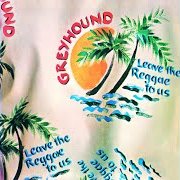 |
Leave the Reggae to Us (1975, 41.59) ***/T |
|
| Dream Lover Stand for Our Rights Jamaica Rum Sky High Wily Only Love Can Win Mango Rock Unchained Melody |
Hold on to Your Happiness Wappadusa Some Dark City |
|
Current availability:
Mellotron used:
Britain's Greyhound, who also operated under several other names, were mainly a singles outfit, in true reggae style, releasing just two albums across the first half of the '70s. After pinching the world-famous US bus company's name, they cheekily repurposed their '50s slogan ('leave the driving to us'), titling their second (and last) long-player Leave the Reggae to Us (a.k.a. Mango Rock, a.k.a. Dream Lover, a.k.a. Reggae Soul). A set of mostly covers, they tackled Bobby Darin's Dream Lover and Unchained Melody, best known for the Righteous Brothers version, amongst others, while their own compositions tended towards instrumentals, chiefly vehicles for guitar and organ solos. Highlights? Their version of Gary Wright's Stand For Our Rights, their own Mango Rock and lengthy, ripping closer Some Dark City.
Given that the album seems to've been pieced together from various recording sessions (several tracks had previously appeared on 7"), Sonny Binns' Mellotron use was probably constrained by whether or not there was one in the studio they were using at the time. As a result, all we get is orchestral-replacement strings on opener Dream Lover and Hold On To Your Happiness. Not the most exciting thing you'll hear all year, then, although Some Dark City is worth the price of admission.
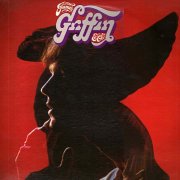 |
Breakin' Up is Easy (1973, 34.20) **/T |
|
| Breakin' Up is Easy Someday Love You Till The Cows Come Home She Knows Father & Son You'll Get Along Lifeline Going Back to Boston |
Only Now Love to Light the Way |
|
Current availability:
Mellotron used:
James Griffin (1943-2005) was the vocalist/guitarist in phenomenally successful soft rock crew Bread who wasn't David Gates, which is why his name may not ring any bells. After Bread's initial split (seemingly largely due to Griffin's irritation over Gates' compositional domination of their single releases), his first solo effort, credited to James Griffin & Co., Breakin' Up is Easy, is pretty much what you'd expect: er, soft rock. I mean, even when it rocks (Love You Till The Cows Come Home), it rocks... softly. Is there a best track? Possibly the balladic Going Back To Boston, but only because it's marginally less gloopy than everything else here.
None other than our old friend Michael "Iceberg" Iseberg plays keys, including Mellotron (although he's known for his Chamberlin use) on Going Back To Boston, with polyphonic flute and string parts, not to mention a churchy organ part in the middle that elevates the track to 'top dog' position. But is it enough to make this worth hearing? Not really, no.
See: Michael Iceberg
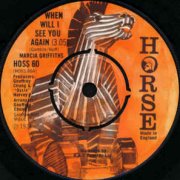 |
7" (1974) ***/TT Marcia Griffiths When Will I See You Again Onika When Will I See You Again |
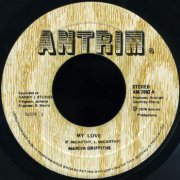 |
7" (1974) ***/T Marcia Griffiths My Love The Now Generation [credited as Jam Now Gen] My Love (version) |
Current availability:
Mellotron used:
Marcia Griffiths is known chiefly for her membership of Bob Marley's vocal backing group, the I-Threes, although by the time she joined them, she'd already had a successful career, both solo and collaborating with Jamaican male vocalists. 1974's When Will I See You Again is a reggae-lite version of The Three Degrees' major hit from the same year, Griffiths' superb, soulful voice to the fore. The flip is a typical reggae trick: the same backing track as the 'A', with a different vocal, in this case credited to Onika (Griffiths again?), a bizarre, Je T'Aime-style treatment of the lyric. An unknown studio musician plays 'orchestral replacement' Mellotron strings to reasonable effect, although it's hardly something you're not going to be able to live without.
The same year's My Love is a similar effort, its flip 'version', again, being credited to someone else, in this case, Jam Now Gen, better known as The Now Generation. Quite possibly the same unknown studio musician plays muted 'orchestral replacement' Mellotron strings on the 'A', for what it's worth.
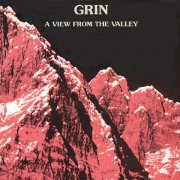 |
A View From the Valley (1985, 44.15) ***/T½ |
|
| The Masters of Plenty You Need a Gun to Blow My Mind I Have to Close My Eyes to See You Untitled Thirty Coins A View From the Valley So Tired Gathered Around the Monument |
Whoevergetsherefirst Worried A Million Things to Do |
|
Current availability:
Mellotron used:
The trouble with calling your band Grin in the '80s is that Nils Lofgren had already put out a couple of albums under the same name a decade earlier. Unsurprisingly, information on the later band is difficult to trace; in fact, all I can tell you is that they released an album called A View From the Valley in 1985. I'd expected crummy, mid-'80s pop, so it comes as a pleasant surprise to be able to report that it contains frequently atmospheric pop/rock, stylistic pointers including The Police, contemporaneous Talk Talk and various eras of Pink Floyd. Best tracks? Probably powerful opener The Masters Of Plenty, the offbeat title track and Worried, but nothing here offended this listener.
Marjolein van den Hombergh plays occasional Mellotron, with a single (male?) choir chord on the title track and more robust string parts on Worried and closer A Million Things To Do, although it's hardly a major component of their sound. So; slightly proggy Dutch mid-'80s pop that sounds better than that description, but don't bother for the Mellotron.
 |
Veckatimest (2009, 52.20) ***/TT |
|
| Southern Point Two Weeks All We Ask Fine for Now Cheerleader Dory Ready, Able About |
Hold Still While You Wait for the Others I Live With You Foreground |
|
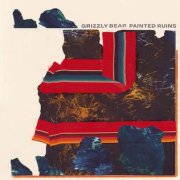 |
Painted Ruins (2017, 48.28) **/½ |
|
| Wasted Acres Mourning Sound Four Cypresses Three Rings Losing All Sense Aquarian Cut-Out Glass Hillside |
Neighbors Systole Sky Took Hold |
|
Current availability:
Mellotrons used:
Grizzly Bear are difficult to categorise, which is probably a good thing. Jazz-folk? Psych-Americana? Elements of all those styles and more infiltrate their third album, 2009's Veckatimest, named for a small, uninhabited island in the Cape Cod area, apparently. It's the sort of record people grow to love, full of heavenly harmonies, unusual instrumentation and emotional honesty (did I hear someone say Beach Boys?), although I'm afraid to say, it has yet to grow fully on me. Don't get me wrong; it's a good record, but possibly not as good as people think it is, or as good as it thinks it is itself.
An uncredited someone (presumably either Ed Droste or Daniel Rossen) plays the Mellotron they found in an old studio up in the Catskills, Allaire, one of three recording locations for the album. Three obvious tracks, with wobbly cellos on All We Ask, choking to a halt at the end of the song, proving the machine's veracity, muted flutes on Cheerleader and finally, some very pre-war-sounding flutes opening I Live With You, cellos later on. I have to say, it's nice to hear a definitely real machine being used by a young band; I'm sick to death of the rampant sample use (for other keyboards, too) that has almost become the norm these days. Sad to say, 2017's Painted Ruins is awful, the band having entered the indie mainstream in the interim, having no obviously redeeming features. Perhaps Four Cypresses is slightly less unpleasant than everything else. Three Mellotron tracks (Allaire's M400 again), all strings, with the odd chord on opener Wasted Acres, a more obvious part on Four Cypresses and a less obvious one on Losing All Sense, played by any of Christopher Bear, Daniel Rossen or Chris Taylor.
Grobschnitt (Germany) see: |
 |
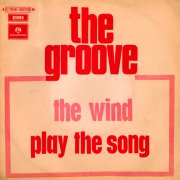 |
7" (1969) **½/½ The Wind Play That Song |
Current availability:
Mellotron used:
The Groove were a medium-successful Aussie soul group of the late '60s who, like so many others, made the trip to London, funding it from the proceeds gained by winning a major battle of the bands-style competition back home. The Wind was their last single (of six) released under their original name, although one more appeared with them billed as Eureka Stockade. It's a rather overblown ballad, slightly reminiscent of The Tremeloes from a year or two earlier, backed by the respectable rock'n'roll of Play That Song.
Presumably keyboard player Tweed Harris adds Mellotron to the A-side, though only towards the end, with a string part that doubles the Hammond chords running through the song. The A-side was included on Rubble 14, now apparently included in the Rubble 11-20 box set, but I don't know if the flip's available anywhere - all information welcome. But do you want to hear it? Do you like Aussie '60s pop? Then yes. No? Draw your own conclusion.
See: Eureka Stockade
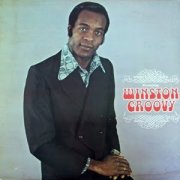 |
Presenting Winston Groovy (1974, 33.26) **½/T |
|
| Hot Blooded Man People So Easy What Good is Life Things Scientist Please Don't Make Me Cry Wheel and Jig |
Give a Little Love Sing and Dance Let Me Be There Fall in Love |
|
Current availability:
Mellotron used:
Winston "Groovy" Tucker moved to the UK from Jamaica in 1961, relocating to London at the end of that decade; although he'd been involved in music for a while, like many Caribbean artists, he concentrated on singles, explaining why his first album, Presenting Winston Groovy, didn't appear until 1974. It's a long way from The Wailers' revolutionary reggae, veering far closer to the pop end of the spectrum, the sleeve portraying Groovy as more of a Johnny Nash-style crooner than a dreadlocked warrior. The material's decent enough for what it is, many songs embellished with Clavinet or rudimentary synth parts, although it's hardly the kind of thing that sets the world alight these days.
An unknown session man played Mellotron on a re-recording of Groovy's 1970 hit, Please Don't Make Me Cry, with a pseudo-orchestral string part, although the strings and brass on the soul/reggae Scientist are real. Fans of '70s pop/reggae may well go for this, although I can't imagine anyone else getting too hot under the collar about it, either for the music or the Mellotron.
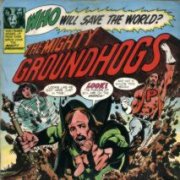 |
Who Will Save the World? The Mighty Groundhogs! (1972, 35.40) ****/TT½Earth is Not Room EnoughWages of Peace Body in Mind Music is the Food of Thought Bog Roll Blues Death of the Sun Amazing Grace The Grey Maze |
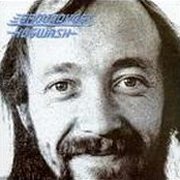 |
Hogwash (1972, 39.25) ***½/TT½I Love Miss OgynyYou Had a Lesson The Ringmaster 3744 James Road Sad is the Hunter S'one Song Earth Shanty Mr Hooker, Sir John |
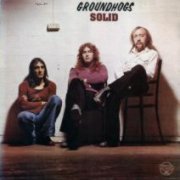 |
Solid (1974, 40.27) ***½/TTLight My LightFree From All Alarm Sins of the Father Sad Go Round Corn Cob Plea Sing, Plea Song Snow Storm Joker's Grave |
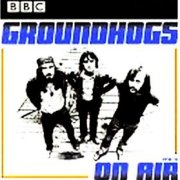 |
On Air 1970-1972 (1998, recorded 1970-72, 73.30) ***½/TT |
|
| Garden Eccentric Man Split, Part 1 Split, Part 2 Mistreated I Love Miss Ogyny You Had a Lesson Earth Shanty |
3744 James Road Sad is the Hunter Split, Part 4 Cherry Red |
|
Current availability:
Mellotrons used:
The Groundhogs formed in the late '60s, leader Tony 'T.S.' McPhee already something of an old blues warhorse even then. They're best remembered for albums such as Thank Christ for the Bomb and the seminal Split, where they redefined blues rock, adding a stoned psych/jamming ambience to it, before discovering progressive rock and heading in another direction. Who Will Save the World? The Mighty Groundhogs! is good, if beginning to show its age somewhat, although its cartoon sleeve still amuses, its environmental theme more relevant than ever today. Ever the iconoclast, T.S. had bought himself a Mellotron and an ARP 2600, in sharp contrast to his blues contemporaries' organ and piano, proceeding to make good use of both, although I'm assured it's actually a hired-in MkII on this album (thanks, Chris).
There's not a bad track on the album, although Bog Roll Blues (toilet paper, for non-Brits) is probably slightly unnecessary, while I'm not sure there was much point in a guitar and harmonium version of Amazing Grace. The Grey Maze is a pretty cool stretched-out piece, though and they don't put a foot wrong anywhere on side one. As far as the Mellotron's concerned, Earth Is Not Room Enough (title adapted from an Isaac Asimov collection) is full-on progressive blues, with a repeating Mellotron string line, although I don't know how McPhee can have played this live. Music Is The Food Of Thought has a flute melody, alternating with brass chords, while Wages Of Peace has a weird, unidentified sound which has to be Mellotron, as McPhee's only credited with 'guitar, Mellotron and harmonium'. Oboes, maybe? Hard to say.
Wasting no time at all, The Groundhogs released Hogwash later that same year. Sticking to their new progressive blues template, they produced another good album in a similar vein to its predecessor, although I detect slightly more jamming, possibly to fill a quickly-recorded follow-up. On the Mellotron front, You Had A Lesson has some nice string chords, double-tracked with brass at one point, but the album's other Mellotron track is easily its highlight. Earth Shanty opens with wave sounds from McPhee's ARP 2600, a strong Mellotron strings part entering the fray before switching to a cello line underpinning the acoustic guitar, brass chords riding over the top. Excellent.
Two years on, Solid's another, er, solid record, despite now sounding slightly dated for '74. As on its predecessors, the band sound (to my ears, anyway) at their best when they're at their furthest from the blues, taking the style somewhere else. Light My Light and Plea Sing, Plea Song are particularly good examples, although I'm less keen on the twisted acoustic blues of Corn Cob. Only two Mellotron tracks this time (with full instrumental credits on the lyric sheet): Sins Of The Father has an excellent string part, as has Snow Storm, making you wonder why ol' T.S. didn't use it more often. His synth use is pretty damn' good, too; maybe they should've got themselves a full-time keyboard player? Now, I know the Groundhogs used their Mellotron live; what's the chances of an official live album from this era?
Well, to answer that semi-rhetorical question, in 1998, Strange Fruit released On Air 1970-1972, although I've only just picked up on it, over a decade later. It seems to consist of sets from those two years, with the earlier one concentrating on the then-new Split and the latter on Hogwash, with a couple of Split tracks thrown in for good measure. The performances are great all round, but I have to assume the 1970 recordings were a studio session, given the two guitar parts, although the '72 stuff's definitely live. Mellotronically speaking, about halfway through You Had A Lesson, the guitar drops out for a few moments before McPhee cuts in with the studio version's major Mellotron strings part, followed by brass, before switching back to guitar. Earth Shanty opens with ARP 2600 wind, as in the studio, followed by Mellotron strings, before the song 'proper' kicks in. A lengthy brass part later on shifts into strings, then to flutes, giving us a nice overview of the contents on McPhee's M400. There's little here that you won't hear on the studio versions, but it is nice to have live takes of the tracks...